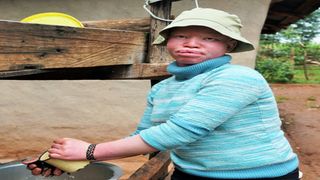
Winnie Jelimo who was allegedly rejected by five schools because of her albinism.
| Tom Matoke | Nation Media GroupElgeyo-Marakwet
Premium
Rejected five times for her condition, student finds space in top school
Rejected by five different schools allegedly because of her albinism, Winnie Jelimo is now just days away from joining Kapkenda Girls High School in Elgeyo Marakwet.
The painful and joyous experience is written all over her face.
Pain because no Kenya Certificate of Primary Education (KCPE) candidate should go through the stress she went through to secure a place in Form One, especially with an impressive 347 marks out of a possible 500.
And she is joyous because, finally, well-wishers came through for her, and now she has a four-year scholarship to study at the top school in Elgeyo Marakwet with the hope of one day becoming a doctor.
“Finally I have found a school after a long struggle of attempts and rejection. I’m happy that I’m now going to an integrated school,” she said.
She said she had felt discriminated against because of her genetic condition, which causes the skin, hair and eyes to have little or no colour.
“They kept telling me there were no vacancies, and one school said they cannot admit an albino. They said there were no vacancies, yet they were admitting others. I felt bad,” she said.
She added: “Albinos can also learn and have a future.”
Full scholarship
And thanks to the Albinism Society of Kenya, Ms Jelimo will enjoy a four-year scholarship and money for her personal expenses.
“The Kenya Education Fund has agreed to sponsor the girl for the next four years. The Albinism Society Kenya shall support her emoluments including the provision of sunscreen lotions and protective clothing. Thanks to all those who reached out or tagged for us to intervene. It’s a calling, not a job,” said former nominated senator Isaac Mwaura, the chair of the Albinism Society.
Ms Jelimo sat the 2020 KCPE exam at Ilula Primary School in Uasin Gishu County and was placed at a school for the visually impaired in the Coast region.
But she is not blind, and she wondered why she was admitted to a school for the blind.
This triggered a frantic search for a different school by her parents, Samuel and Viola Rotich.
“I’m not visually impaired. I cannot be enrolled in a school for the blind as my only physical challenge is the skin, and it is so frustrating to get a calling letter to join a school for the blind,” Ms Jelimo lamented.
Winnie Jelimo and her dad at their home.
She and her father went to five schools, explaining the error in her placement and hoping to be assisted.
They were rejected in all of them. Mr Rotich refuses to name the schools, saying he only wishes they will learn from the experience, but the hurt it inflicted on Ms Jelimo is far from over.
Provide special schools
“I was wondering if I was too strange or delicate to the teachers that they can’t allow me to join other learners or was it expensive to be sustained since I need personal effects like sunscreen lotions, sunglasses and hats to protect against the effects of the sun?” she said.
Mr Rotich, a father of six, thinks the government could have done more for his child, including providing special schools or ensuring those available are better prepared to manage people like his daughter.
Kenya has more than 900,000 people with disabilities, 3,000 of whom have albinism, the 2019 census showed.
Records indicate that five counties have the highest numbers of people with the skin disorder - Kisii (320), Bungoma (229), Kakamega (210), Kiambu (153) and Nandi (64).
Kenya has seen a rapid rise in the number of people with albinism in the past 10 years. It has worked to protect them after a brief scare of ritual believers hunting them for their skin.
Nandi Education Director Zachary Mutuiri directed school heads to ensure they comply with government policies that he said do not allow discrimination based on the skin condition.
No students, he said, should suffer or be denied education opportunities simply because of their skin condition.





